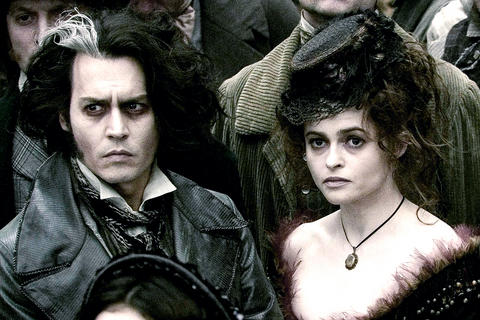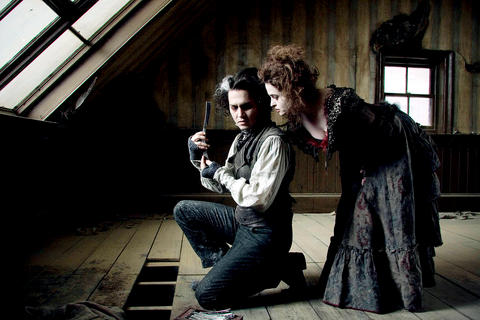Tim Burton makes fantasy movies. Stephen Sondheim writes musicals. It is hard to think of two more optimistic genres of popular art, or of two popular artists who have so systematically subverted that optimism. Sondheim has always gravitated toward the dissonance lurking in hummable tunes, and has threaded his song-and-dance spectaculars with subtexts of anxiety and alienation. Burton, for his part, dwells most naturally (if somewhat uneasily) in the realms of the Gothic and the grotesque, turning comic books and children's tales into scary, nightmarish shadow plays.
And so it should not be surprising that Sweeney Todd: The Demon Barber of Fleet Street, Burton's film adaptation of the musical, is as dark and terrifying as any motion picture in recent memory, not excluding the bloody installments in the Saw franchise. Indeed, Sweeney Todd is as much a horror film as a musical: It is cruel in its effects and radical in its misanthropy, expressing a breathtakingly, rigorously pessimistic view of human nature. It is also something close to a masterpiece, a work of extreme - I am tempted to say evil - genius.
As it was originally performed onstage, with all the songs Sondheim composed for it, Sweeney Todd balanced its inherent grisliness with a whimsical vitality. The basic story is a revenger's tragedy more Jacobean than Victorian, but Sondheim nonetheless wrings some grim, boisterous comedy out of both the impulse for vengeance and the bustling spirit of commerce. A barber, wronged by a powerful judge, returns to London and sets up shop, cutting throats as well as hair. The bodies of his victims are turned into savory meat pies by Mrs Lovett, his energetic partner in business and crime. Cannibalism and mass murder: The basis for a hit show.

It seemed a lot less funny in the recent revival, which starred Michael Cerveris and Patti Lupone in roles originated on Broadway by Len Cariou and Angela Lansbury in 1979. Burton's film, in spite of the participation of Sacha Baron Cohen (as a mountebank barber in a skin-tight costume) and Timothy Spall (as a louche bailiff) pretty much casts out frivolity altogether. Burton's London is a dark, smoky oil slick of a city. Dante Ferretti's production design, which owes something to the Victorian city confected for Carol Reed's Oliver!, can make even daylight look sinister. Innocence, represented by a pair of young would-be lovers (Jayne Wisener and Jamie Campbell Bower) has virtually no chance in this place; it is a joke played by fate, something to be corrupted, imprisoned or destroyed.
Lovett the pie maker is played by Helena Bonham Carter, a witchy fixture of Burton's cinematic universe as well as the mother of his children. If the director has an alter ego, or at least an actor consistently able to embody his ideas onscreen, it would have to be Johnny Depp. He was the hurt, misunderstood man-child in Edward Scissorhands, the cracked visionary in Ed Wood and the cold, creepy candy mogul in Charlie and the Chocolate Factory, in each case giving form to an emotional equation that had never quite been seen on film before. As Sweeney, his hair streaked with white and his eyes rimmed in black, he is an avatar of rage.
Depp's singing voice is harsh and thin, but amazingly forceful. He brings the unpolished urgency of rock 'n' roll to an idiom accustomed to more refinement, and in doing so awakens the violence of Sondheim's lyrics and melodies. Some of the crowd-pleasing numbers, like The Ballad of Sweeney Todd, have been pared away, but their absence only contributes to the diabolical coherence of the film, which moves with a furious momentum toward its sanguinary conclusion.

Like nearly every other horror-film serial killer, Sweeney starts out as a sympathetic figure. Once upon a time, he was a happy husband and father, until his lovely wife (Laura Michelle Kelly) caught the eye of a malignant judge (Alan Rickman), who transported the poor barber to Australia. Now, after many years, he has returned to find that his daughter, now a teenager, has become the judge's ward. Finding his old straight razors - "my friends" - under the floorboards of his former shop, Sweeney sets out to ensnare the judge, a project that requires the deaths of quite a few customers along the way.
"They'll never be missed," sings the practical Mrs Lovett. Sweeney's view is harsher, almost genocidal. "They all deserve to die," he says, looking out over the rooftops of the city. And Burton depicts those deaths ruthlessly.
It may seem strange that I am praising a work of such unremitting savagery. I confess that I'm a little startled myself, but it's been a long time since a movie gave me nightmares. And the unsettling power of Sweeney Todd comes above all from its bracing refusal of any sentimental consolation, from Burton's willingness to push the most dreadful implications of the story to their blackest conclusions.
Sweeney Todd is a fable about a world from which the possibility of justice has vanished, replaced on one hand by vain and arbitrary power, on the other by a righteous fury that quickly spirals into madness. There may be a suggestion of hopefulness near the end, but you don't see hope on the screen. What you see is as dark as the grave. What you hear is equally infernal, except that you might also call it heavenly.

May 11 to May 18 The original Taichung Railway Station was long thought to have been completely razed. Opening on May 15, 1905, the one-story wooden structure soon outgrew its purpose and was replaced in 1917 by a grandiose, Western-style station. During construction on the third-generation station in 2017, workers discovered the service pit for the original station’s locomotive depot. A year later, a small wooden building on site was determined by historians to be the first stationmaster’s office, built around 1908. With these findings, the Taichung Railway Station Cultural Park now boasts that it has

The latest Formosa poll released at the end of last month shows confidence in President William Lai (賴清德) plunged 8.1 percent, while satisfaction with the Lai administration fared worse with a drop of 8.5 percent. Those lacking confidence in Lai jumped by 6 percent and dissatisfaction in his administration spiked up 6.7 percent. Confidence in Lai is still strong at 48.6 percent, compared to 43 percent lacking confidence — but this is his worst result overall since he took office. For the first time, dissatisfaction with his administration surpassed satisfaction, 47.3 to 47.1 percent. Though statistically a tie, for most

Six weeks before I embarked on a research mission in Kyoto, I was sitting alone at a bar counter in Melbourne. Next to me, a woman was bragging loudly to a friend: She, too, was heading to Kyoto, I quickly discerned. Except her trip was in four months. And she’d just pulled an all-nighter booking restaurant reservations. As I snooped on the conversation, I broke out in a sweat, panicking because I’d yet to secure a single table. Then I remembered: Eating well in Japan is absolutely not something to lose sleep over. It’s true that the best-known institutions book up faster

In February of this year the Taipei Times reported on the visit of Lienchiang County Commissioner Wang Chung-ming (王忠銘) of the Chinese Nationalist Party (KMT) and a delegation to a lantern festival in Fuzhou’s Mawei District in Fujian Province. “Today, Mawei and Matsu jointly marked the lantern festival,” Wang was quoted as saying, adding that both sides “being of one people,” is a cause for joy. Wang was passing around a common claim of officials of the People’s Republic of China (PRC) and the PRC’s allies and supporters in Taiwan — KMT and the Taiwan People’s Party — and elsewhere: Taiwan and